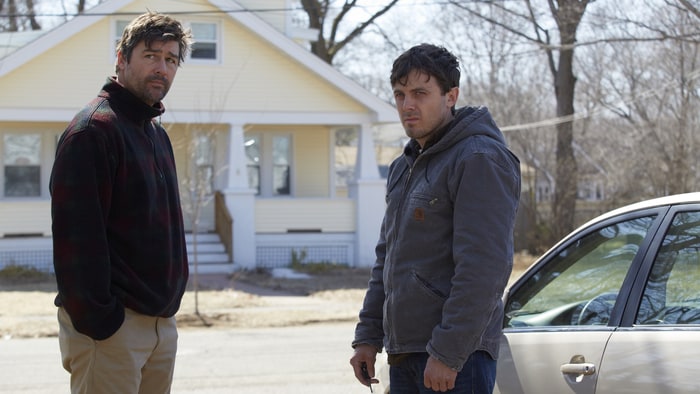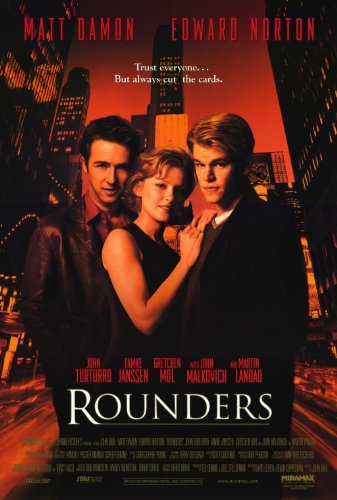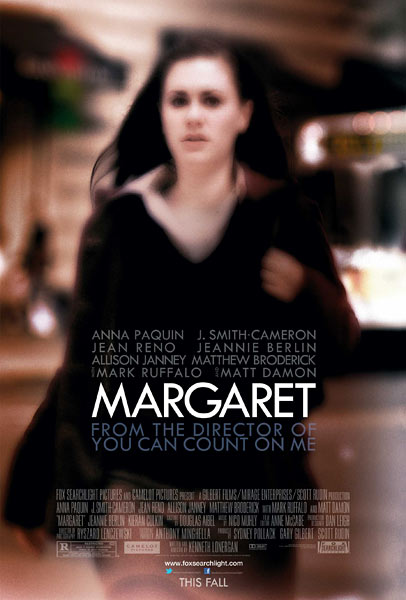
‘Manchester’: unbearable
tragedy, unending film
Kenneth Lonergan’s reputation is such that each rare film is regarded as a gift to the sophisticated, intellectual, mature filmgoer who appreciates character drama and doesn’t require neatly polished happy endings.
Were there more in the Lonergan canon, most critics would rightly shrug off “Manchester by the Sea” as a nice try and little else.
“Manchester” fails on multiple levels. The best drama is offscreen. The female characters are helpless. The 15-year-old kid acts like he’s 25. The flashbacks are uneven and disruptive. The psychological profile doesn’t begin to hold water.
Lonergan, though, gets the benefit of the doubt. Matt Zoller Seitz, editor of rogerebert.com, correctly notes, “On the surface this would all appear to be yet another twist on a familiar and often tedious Hollywood formula, the childish adult who’s forced to grow up by being forced to take care of a minor.” But in the next sentence, he claims, “Lonergan has too much respect for his characters, his audience, and perhaps reality itself to indulge such nonsense.”
Richard Roeper likewise observes, “This is a story that in lesser hands could have been mired in melodrama and wrapped up with an audience-pleasing bow.”
In fact, it’s mired in boredom and erratic flashbacks as Lonergan struggles for visuals aside from the beautiful sailing vistas of New England.
Paperwork is boring. It’s not at all photogenic. But that’s the catalyst of “Manchester,” discovery of a legal document that threatens to upend Lee’s world. This draws parallels to the unfortunate cliffhanger in George Clooney’s “The Descendants,” whether to sign a piece of paper.
Lee learns that his brother has designated him as the guardian for his brother’s son, Patrick. It’s doubtful that a person can unilaterally assign another person to be guardian to one’s kids. (“I want my children to grow up in the Bill and Melinda Gates household.”) One thing we learn is that you never want to assign a prospective guardian to your kids who doesn’t know he’s the guardian. It seems like Lee can refuse. Even more, what better time for the boy to return to his mother?
More than struggling with the responsibility, Lee struggles with … geography. He says the boy can live with him in Boston but not in Manchester, where for some reason, the condition of a boat is very important yet not covered in the will. (There is an unfortunately applicable refrain from critics of “Gilligan’s Island”: fix the boat and go home.)
But this is artistry, not legality. We get that Lonergan is putting Lee in an emotional pickle. It’s just not a particularly photographable one.
In his short film career, Lonergan’s tendencies are evident: broken or incomplete families with tight bonds and pent-up sexuality who happen to live in some of the most picturesque settings of the Northeast. But he’s not the first to put a movie in Manchester.
Lee, whose portrayal by Casey Affleck resembles the look of Jake Gyllenhaal and the voice of Mark Ruffalo, is a much different piece of work. Lonergan misses a couple of enormous opportunities. He could make Lee someone who does not care about anything. That would be a fascinating study, whether a sane human could be reduced to valuing nothing and exploring what the consequences may be. Lonergan won’t go that far.
Instead he dabbles in guilt psychology. Guilt is a powerful concept. Does it make a person violent? A valid model is “The Reader,” in which Kate Winslet’s Hannah, like Lee, struggles to move on. She is judged for her actions and approves of the harsh outcome as just and cathartic. In “Manchester,” Lee has already been judged; his reaction is little more than mild surprise.
Hannah makes dubious decisions that seem a subtle cry for help. Does Lee Chandler actually want any help? This would be good to know. Lonergan doesn’t seem sure.
Lee is a violent person. Lonergan unfortunately takes the “Good Will Hunting” approach, that randomly beating people up can be attributed to psychological trauma. (Matt Damon is a producer of “Manchester” and was originally to star and direct.) The fights in “Manchester” are filler (especially a ridiculous encounter that serves as Lonergan’s obligatory cameo), intended to show Lee in an exciting, non-brooding type of situation without acknowledgment of the consequences of such a characteristic — that maybe it doesn’t actually have anything to do with the movie.
There is no indication anyone has ever suggested professional help for Lee. That’s fair. Therapy or analysis seems too sophisticated for him. Yet after a couple of bar scrapes, that would undoubtedly be the next step. A lot of times in these movies, a “natural” cure triumphs over laboratory efforts. It’s too bad no one in “Manchester” realizes the value of talking — it’s free, limitless, and one can’t possibly overdose.
If you think Lee’s guilt is great, consider that of Elise, Patrick’s mother. Somehow she has so failed in life that not only does she never see her son, she apparently has no rights as his guardian when her ex-husband dies. In her scenes, she seems anxious, tense and difficult, but not a lost cause. How she managed to be written out of her son’s life and OK with it, we can only guess.
Patrick is played by Lucas Hedges, who was likely about 20 during filming. Though only 15, Patrick talks and acts like a remarkably narcissistic 25-year-old who nevertheless is undone by frozen chicken. His story is better suited for the “American Pie” franchise. Like his uncle, he appears to have a violent streak. He might even have a sex addiction, which Lee grudgingly tries to enable, an incident portrayed as bonding that could even be viewed as borderline illegal.
Lee’s ex, Randi, played by Michelle Williams as yet another blue-collar wife in a tortured marriage, does not seem consumed by any guilt. How she confronted Lee after their tragedy is not particularly clear. Their scene together on a street is the film’s crown jewel, but it’s too late, after the heavily diluted drama has worn too thin.
Over a century, moviemakers have learned the importance of 120 minutes. For whatever reason, this is the amount of time that packs the most cinematic punch and does not push audience endurance. Movies that go beyond that allotment of time need something special to justify it.
“Manchester,” at 137 minutes, drains the viewer while delivering minimal payoff. But trimming 30 minutes wouldn’t trim the problems.
Scenes at the hospital run excruciatingly long. Lonergan feebly tries to beef up the guilt complex by having Lee arrive too late; then he spends forever asking questions to stone-faced doctors and nurses and staring at them.
It’s a Lonergan film, thus we’re bound to see Matthew Broderick; by the time he arrives, we know what he’s going to be and how he’s going to be an awkward thorn in the Chandlers’ side.
Flashbacks, strategically used, can be an effective device; in this film they are a crutch, needed to break the unwatchable monotony of Lee’s present life. They are not difficult to discern but are choppy, throwing around the viewer like the waters of Cape Ann.
“You Can Count on Me” was under two hours, tight as a drum. “Manchester,” like Lonergan’s previous “Margaret,” overindulges, draining viewers for two and a quarter hours for limited payoff, asserting extra time it doesn’t merit.
By the time viewers figure out what’s going on, the heartbreak in “Manchester” is long past. A revelation is nowhere on the horizon, and won’t be, until we know what Lee wants.
2 stars
(December 2016)
“Manchester by the Sea” (2016)
Starring Casey Affleck as
Lee Chandler ♦
Ben O’Brien as
Young Patrick ♦
Kyle Chandler as
Joe Chandler ♦
Richard Donelly as
Mr. Martinez (1st Tenant) ♦
Virginia Loring Cooke as
Mrs. Groom (2nd tenant) ♦
Quincy Tyler Bernstine as
Marianne (3rd Tenant) ♦
Missy Yager as
Mrs. Olsen (4th Tenant) ♦
Stephen McKinley Henderson as
Mr. Emery ♦
Ben Hanson as
Bartender ♦
Mary Mallen as
Sharon ♦
Lewis D. Wheeler as
1st Businessman at Bar ♦
Anthony Estrella as
2nd Businessman at Bar ♦
C.J. Wilson as
George ♦
Susan Pourfar as
Nurse Irene ♦
Robert Sella as
Dr. Muller ♦
Ruibo Qian as
Dr. Bethany ♦
Gretchen Mol as
Elise ♦
Tom Kemp as
Stan Chandler ♦
Chloe Dixon as
Suzy Chandler ♦
Michelle Williams as
Randi Chandler ♦
Ellie Teves as
Karen Chandler ♦
Paul Meredith as
Paul (Assistant Principal) ♦
Carolyn Pickman as
Paul’s Assistant ♦
Lucas Hedges as
Patrick ♦
Tate Donovan as
Hockey Coach ♦
Christian Mallen as
CJ ♦
Oscar Wahlberg as
Joel ♦
Kara Hayward as
Silvie ♦
Josh Hamilton as
Wes (Joe’s Lawyer) ♦
Wendy Overly as
Wes’s Assistant ♦
Shawn Fitzgibbon as
Tom Doherty (Ping-Pong Player) ♦
Glenn McKiel as
Manchester Police Chief ♦
Joe Stapleton as
Fire Marshal ♦
Brian Chamberlain as
Investigating Detective ♦
Kenneth Lonergan as
Manchester Pedestrian ♦
Anna Baryshnikov as
Sandy ♦
Jackson Damon as
Otto ♦
Heather Burns as
Jill ♦
Jami Tennille Mingo as
Janine ♦
Liam McNeill as
Josh (Randi’s Husband) ♦
Allyn Burrows as
Father Martin ♦
Nellie Lonergan as
1st Girl at School (‘Godspell’) ♦
Brian White as
Jerry (Guy in Boat Yard Office) ♦
Erica McDermott as
Sue (Angry Boss in Boat Yard Office) ♦
Matthew Broderick as
Jeffrey ♦
Danae Nason as
Rachel (Randi’s Friend) ♦
Frank Garvin as
Homeowner
Directed by: Kenneth Lonergan
Written by: Kenneth Lonergan
Producer: Matt Damon
Producer: Chris Moore
Producer: Lauren Beck
Producer: Kimberly Steward
Producer: Kevin J. Walsh
Co-producer: Ryan H. Stowell
Associate producer: Katie Pastore
Executive producer: John Krasinski
Executive producer: Declan Baldwin
Executive producer: Bill Migliore
Executive producer: Josh Godfrey
Music: Lesley Barber
Cinematography: Jody Lee Lipes
Production design: Ruth De Jong
Art direction: Jourdan Henderson
Set decoration: Florencia Martin
Editing: Jennifer Lame
Unit production manager: Philip L. Parslow
Casting: Douglas Aibel
Costumes: Melissa Toth
Makeup: Liz Bernstrom, Sherryn Smith
Production supervisor: Jonathan Joseph
Post-production supervisor: Stuart Macphee
Unit production manager: Declan Baldwin
Stunts: Paul Marini, Patrick M. Walsh, Jeffery Kincannon, K.C. Faldasz, Jon Gombos, Robert Lee Harvey, Chad Knorr, Nicholas Varga
Special thanks: Dorsey James, John Powers Middleton, Matthew Myers





